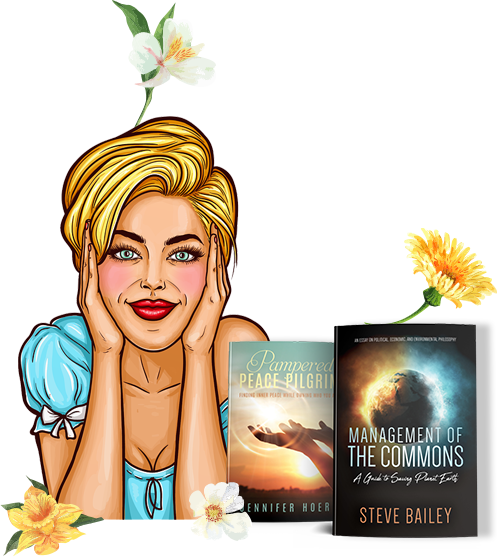How To Title A Book: Choosing a Book Title, Subtitle, and Tagline
Publish Your Book View 50% off Pricing
The word or phrase that designates a part of a work or the whole is known as a title. This represents the content while trying to arouse the interest of the reader, fit it correctly into its genre and differentiate it from its competitors (it will be necessary to investigate).
For example, whoever is looking for a new reading and comes across the title of a book like Cloudy with a Chance of Meatballs will not be indifferent, they will surely want to know at least the plot and certainly will not forget it completely.
When mentioned in a text in Spanish, the titles of works (publications, songs, paintings, films, series.) are written in italics. However, the entities responsible for the work, the sacred books, and the collections are in round print.
The time has come: we are in front of a blank sheet, about to START our GREAT novel when it comes to our minds that we should give it a title. Something original that conveys the essence of the story; a name that sounds as perfect and special as we want. But the words don’t flow; worse still, we can’t come up with anything DECENT! Minutes go by and nothing changes.
You know what has happened to you, so keep reading, because it will never happen to you again!
Table of Contents
ToggleKey Elements
Before we start thinking about possible titles for our novel, we have to take into account three very important aspects: the genre, the setting, and the audience to which our story is directed.
The Gender
To begin with, the genre of our story will give rise to a series of titles. Obviously, a science fiction novel is not the same as a horror novel, just as neither is a fantasy and a romantic novel. Be aware that each genre will tend towards a certain title style.
The Ambientation
Once we are clear about this aspect, we must repair the setting. This comes to say more or less the same as in the previous point. In this case, we will have to keep in mind the historical context of our novel -if it takes place in the Middle Ages, in the future, or in an imaginary time- to choose a suitable title.
The Public
Don’t forget the audience your novel is aimed at. A title for a story dedicated to children between eight and ten years old, in which we would have to opt for a more predictable name, is not the same as one for people over sixteen, in which we could play with more hidden or double words. meaning.
How To Choose a Title for A Book
Choosing a title that we like and find suitable for our story is a complicated task, so the main thing is not to get overwhelmed. If you can’t find a name before starting the story, absolutely nothing happens. The best thing is that you start writing since it is very likely that inspiration will come to you while you are working: a phrase, an object, a place, or a creature from your novel can be the key to finding that great title.
However, you can also use the title lists. Write on a piece of paper all the possible names that come to mind and let them rest for a while. After two days, review the list and cross out those that do not convince you, and so on. In this way, you will end up selecting the ones that you like the most and discarding the less appropriate ones.
If none of this works and you still don’t have a title for your novel: don’t worry! Seek the opinion of your family, friends, or even the publisher itself if you are lucky enough to be published. They will advise you and give you new ideas that you may have overlooked.
Aspects To Consider
Before definitively opting for a title, check its sound; that is to say, that it sounds good, and avoids long and complicated words. Stop for a second to think and think if the title conveys the essence of your story; think that through it you have to define what it is about.
Lastly, try to be original. Search the Internet to see if there is another book with that name, song, or movie. It is normal that yes, but still try to differentiate yourself in something; for example, adding a subtitle. This will avoid potential confusion.
And here are today’s tips! Have they helped you with the title of your story? Have they made you raise their name in another way? How do you choose the titles? Are you one of those who are unable to start writing without one? tell me!
Other Features of a Book Title
In traditional publishing, agents and publishers alike know that the headline that comes their way is not final, although it will matter if it makes a big impression on them.
The title of a book is essential for marketing since it is the first or second hook of a work for the reader (often the cover precedes it). By the way, the fact that in public the authors refer to the text by its title instead of “my book” will give it an existence of its own and will intrigue whoever listens.
Sometimes, the title of a book is complemented by a secondary phrase called a subtitle, which usually indicates which installment of a series it is about or, especially in non-fiction, further delimits the subject of the writing and includes certain words that return it between the first results of digital searches. For example, if we write a creation such as The Yellow Giant, its title could refer to a fictional story, an empire, or even a historical figure, but we can use a subtitle like “airport architecture” to introduce the subject matter of the book. and relate it to several valuable keywords.
Titles and subtitles are not usually protected by intellectual property legislation unless they have been registered as trademarks or one intends to take advantage of the confusion with successful manuscripts. In most cases, then, we will be able to use an expression despite the fact that others have already used it for a headline (better that it be of another genre), although the ideal is to think of one of our own so that our creation is unique.
The Slogan of a Work
In addition to these elements, when we create stories, we can suggest with more or less ingenuity what the story is about through a slogan or tagline, as used by the audiovisual industry (some films have more than one).
– Title: Mrs. Winberg’s bag.
– Tagline: Perhaps the enemy invites you to eat on Sundays.
– Logline (shortened version of the commercial synopsis): A rookie agent must capture the culprit of all the crimes he has investigated so far: his mother.
How to Find a Good Title
Let’s analyze the components of the work —its concepts, characters, places, dialogues— and list those that most represent it, its essence. Short or long, let’s read aloud, let’s see which are already books in the main stores (Casa del Libro has a great fund), and let’s consider which include highly searched keywords on the Internet. Let‘s keep in mind that if we choose rare terms, there will be less competition in results, but it will be less likely that someone will type that name into a search engine.
If it is part of a series, it must be taken into account, since frequently the titles of the different parts are related, for example with the same syntactic structure.
With a few discarded, let’s further narrow down the options by determining the pros and cons of each one: is it easy to remember? Pronunciation? Would it sound good when translated into the most widely spoken languages? Is the domain available? Let’s make a list, face the favorites in a tournament, and/or ask the beta readers their opinion.
Sometimes, after a while, we may discover that a book title doesn’t work, so we can consider changing it. When there is no printed, merchandising or web version with the name of the work, it can be changed, although the cover will then have to be reformed and the information on the platforms and the press kit updated. Some agents and publishers, for their part, may suggest changing the title when they accept our manuscript.





